-
 Bitcoin
Bitcoin $84,278.9725
-0.42% -
 Ethereum
Ethereum $2,296.3504
-1.69% -
 Tether USDt
Tether USDt $0.9991
0.05% -
 XRP
XRP $2.1772
-0.40% -
 BNB
BNB $601.6772
-1.25% -
 Solana
Solana $136.3518
-0.02% -
 USDC
USDC $0.9999
0.00% -
 Dogecoin
Dogecoin $0.2055
1.05% -
 Cardano
Cardano $0.6393
-1.38% -
 TRON
TRON $0.2274
0.29% -
 Chainlink
Chainlink $15.0150
-1.37% -
 Litecoin
Litecoin $124.9704
0.80% -
 Avalanche
Avalanche $22.1008
0.66% -
 Stellar
Stellar $0.2810
-1.28% -
 Toncoin
Toncoin $3.4297
-1.57% -
 UNUS SED LEO
UNUS SED LEO $9.2281
1.53% -
 Sui
Sui $2.7544
-4.35% -
 Shiba Inu
Shiba Inu $0.0...01432
-0.21% -
 Hedera
Hedera $0.1999
1.37% -
 Polkadot
Polkadot $4.8521
2.05% -
 MANTRA
MANTRA $7.3522
3.42% -
 Hyperliquid
Hyperliquid $20.5480
2.01% -
 Ethena USDe
Ethena USDe $0.9992
0.05% -
 Bitcoin Cash
Bitcoin Cash $295.4055
0.68% -
 Dai
Dai $0.9998
0.00% -
 Bitget Token
Bitget Token $4.1437
3.49% -
 Uniswap
Uniswap $7.8015
-2.29% -
 Monero
Monero $208.6870
-3.21% -
 NEAR Protocol
NEAR Protocol $3.0357
-0.20% -
 Aptos
Aptos $6.0934
1.44%
web3 wallet authorization cancellation
By canceling authorization for dApps you no longer use, you enhance the security of your Web3 wallet and reduce the risk of unauthorized access to your digital assets.
Oct 20, 2024 at 08:12 pm

Web3 Wallet Authorization Cancellation: A Step-by-Step Guide
Web3 wallets have become a cornerstone of accessing decentralized applications (dApps) and managing digital assets. However, situations may arise where you need to revoke or cancel authorization for specific dApps. Here's a comprehensive guide on how to do that:
Connect to Your Web3 Wallet:
- Access your Web3 wallet through your preferred method, such as a browser extension or mobile application.
Navigate to Connected dApps:
- Most Web3 wallets have a section where you can manage connected dApps. Look for a tab or menu labeled "Connected Sites" or "dApp Permissions."
Identify the dApp to Cancel Authorization:
- You should see a list of all the dApps you've previously authorized to connect to your wallet. Find the one you want to cancel authorization for.
Initiate Authorization Cancellation:
- Depending on your wallet provider, you may have different options to revoke authorization. Typically, there will be a "Revoke" or "Cancel" button next to the dApp's entry. Click it.
Confirm Cancellation:
- A confirmation prompt will appear, asking you to verify that you want to remove the dApp's access to your wallet. Click "Confirm" or "Yes."
Check Authorization Status:
- Once you've confirmed the cancellation, go back to the list of connected dApps and verify that the authorization has been revoked. The dApp should no longer be visible in the list.
Restart Your Wallet (Optional):
- In some cases, restarting your Web3 wallet may be necessary to ensure that the authorization cancellation takes effect.
Additional Tips:
- Regularly Review Authorized dApps: Regularly check the list of connected dApps and remove any you no longer use to reduce security risks.
- Use a Trusted Wallet: Always use a reputable and secure Web3 wallet to protect your assets and prevent unauthorized access.
- Disable Wallet Scanning: If possible, disable wallet scanning services to prevent dApps from automatically connecting to your wallet without your consent.
- Keep Your Recovery Phrase Safe: Always keep your wallet's recovery phrase private and secure. Never share it with anyone.
Disclaimer:info@kdj.com
The information provided is not trading advice. kdj.com does not assume any responsibility for any investments made based on the information provided in this article. Cryptocurrencies are highly volatile and it is highly recommended that you invest with caution after thorough research!
If you believe that the content used on this website infringes your copyright, please contact us immediately (info@kdj.com) and we will delete it promptly.
- Bitcoin Price Likely to Hit $81k Says Analyst While This Altcoin Rises 234x in Days
- 2025-02-28 09:15:33
- Ripple's altcoin XRP falls 0.95% on February 27th, with weekly and monthly timeframes revealing a not-so-optimistic outlook.
- 2025-02-28 09:15:33
- Ripple Releases Its 2025 Strategic Development Plans, Focusing on Enhanced Institutional DeFi and Lending
- 2025-02-28 09:15:33
- Web3Bay Presale Soars Past $1.54M as Bitcoin Drops to $95,000
- 2025-02-28 09:10:33
- Seeking high-growth cryptos in this market chaos? Bitcoin, XRP, and other cryptocurrencies tried to recover early Thursday
- 2025-02-28 09:10:33
- Bitcoin (BTC) Exchange-Traded Funds (ETFs) Offering Staking Capabilities Could Significantly Boost Institutional Engagement
- 2025-02-28 09:10:33
Related knowledge
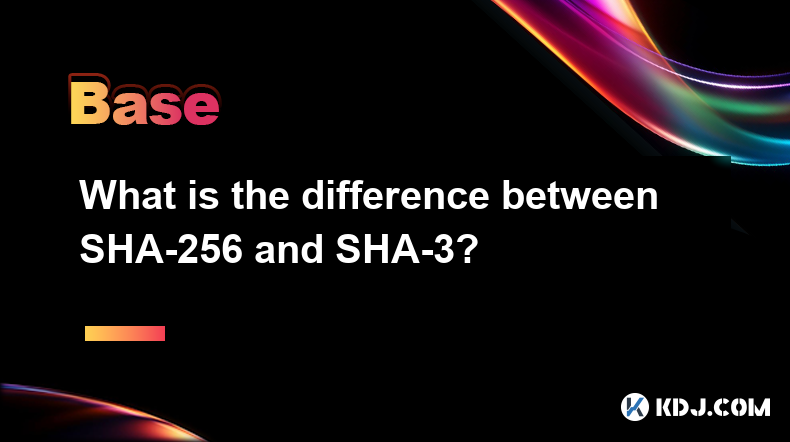
What is the difference between SHA-256 and SHA-3?
Feb 27,2025 at 07:37pm
What is the difference between SHA-256 and SHA-3?Key Points:SHA-256's Design and Security: SHA-256, part of the SHA-2 family, is a widely used cryptographic hash function based on a Merkle–Damgård construction. Its security relies on the assumed difficulty of certain mathematical problems. While it hasn't been demonstrably broken, ongoing research and t...
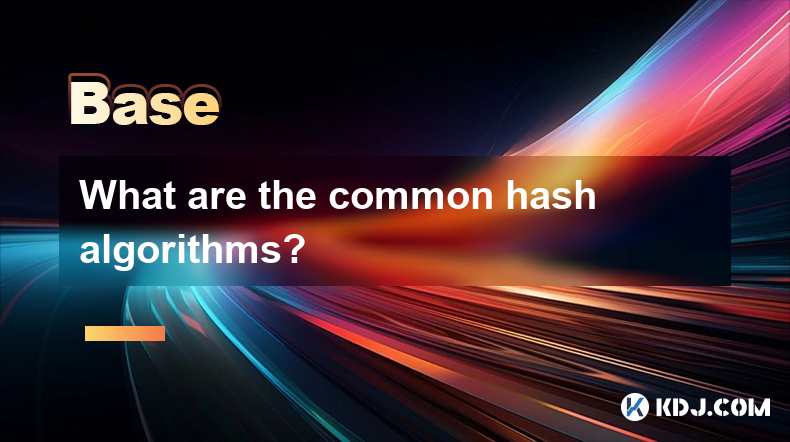
What are the common hash algorithms?
Feb 28,2025 at 02:06am
What are the Common Hash Algorithms? A Deep Dive into Cryptographic Hash FunctionsKey Points:This article explores various common hash algorithms used in the cryptocurrency space, detailing their functionalities, strengths, weaknesses, and applications.We will delve into the specifics of SHA-256, SHA-3, Scrypt, Blake2b, and Keccak-256, explaining their ...
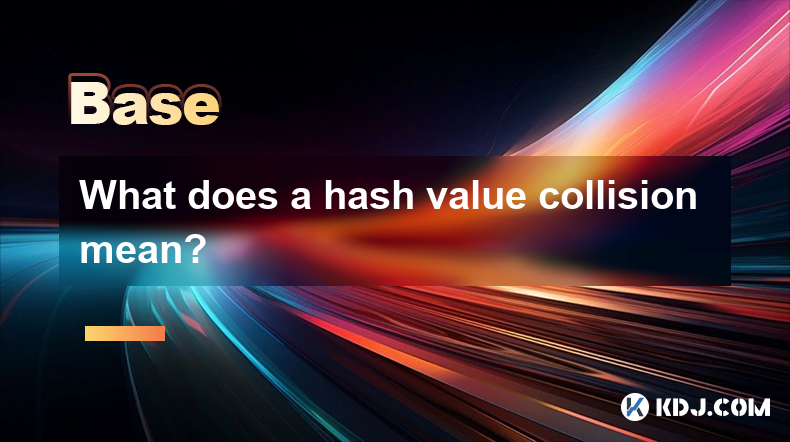
What does a hash value collision mean?
Feb 28,2025 at 12:18am
What Does a Hash Value Collision Mean? A Deep Dive into Cryptographic Hashing and its ImplicationsKey Points:A hash collision occurs when two distinct inputs produce the same output hash value. This is a critical vulnerability in cryptographic systems relying on hash functions for data integrity and security.The likelihood of a collision depends on the ...
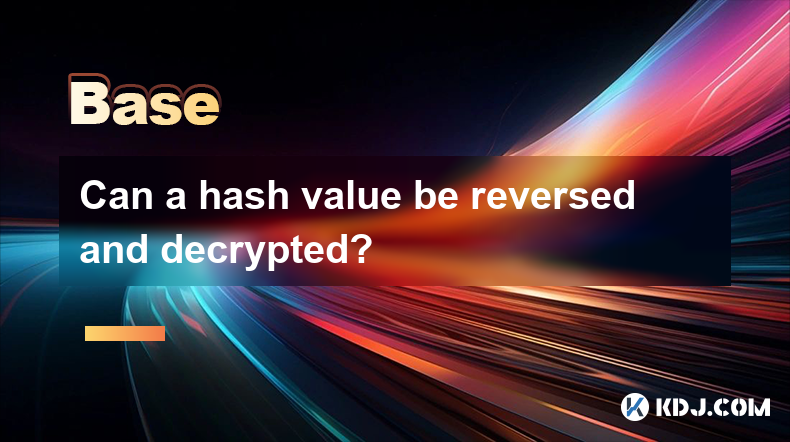
Can a hash value be reversed and decrypted?
Feb 27,2025 at 06:00pm
Can a Hash Value Be Reversed and Decrypted?Key Points:Hash functions are one-way cryptographic functions; reversing a hash to obtain the original input is computationally infeasible.While technically not impossible, reversing a hash requires an immense amount of computational power and time, making it practically impossible for all but the shortest and ...
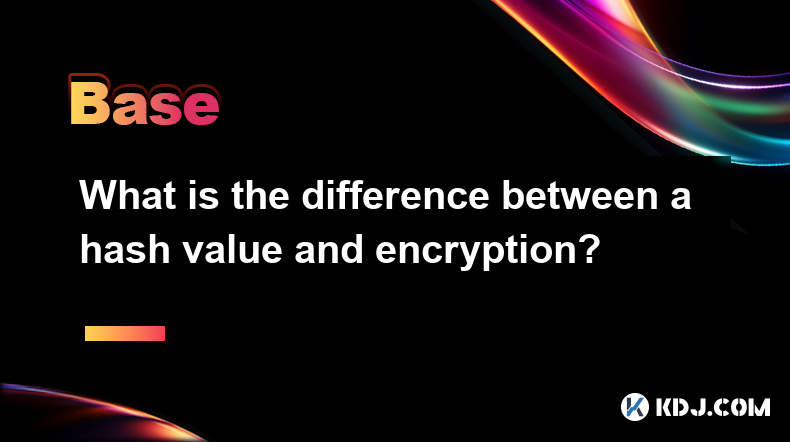
What is the difference between a hash value and encryption?
Feb 27,2025 at 08:01pm
What is the difference between a hash value and encryption?Key Points:Hashing: A one-way function producing a fixed-size output (hash) from any input, ensuring data integrity but not confidentiality. It's crucial for blockchain technology's security.Encryption: A two-way process involving an algorithm and a key to transform readable data (plaintext) int...
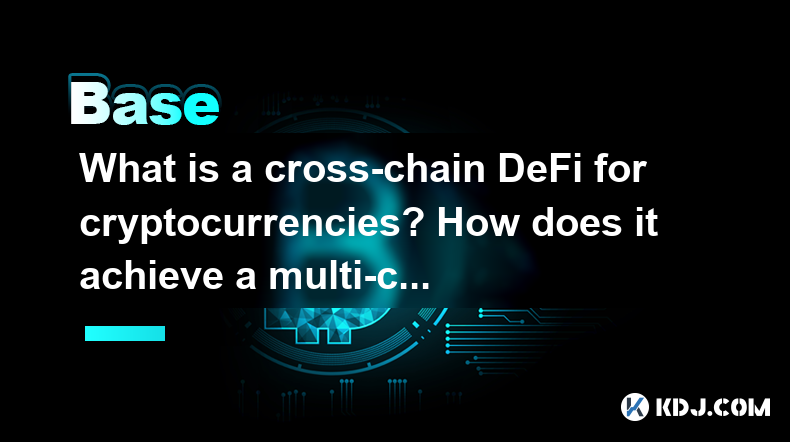
What is a cross-chain DeFi for cryptocurrencies? How does it achieve a multi-chain financial ecosystem?
Feb 26,2025 at 11:24pm
What is a Cross-Chain DeFi for Cryptocurrencies? How Does it Achieve a Multi-Chain Financial Ecosystem?Key Points:Definition of Cross-Chain DeFi: Cross-chain DeFi refers to decentralized finance (DeFi) applications and protocols that operate across multiple blockchain networks, enabling interoperability and bridging the gaps between isolated ecosystems....

What is the difference between SHA-256 and SHA-3?
Feb 27,2025 at 07:37pm
What is the difference between SHA-256 and SHA-3?Key Points:SHA-256's Design and Security: SHA-256, part of the SHA-2 family, is a widely used cryptographic hash function based on a Merkle–Damgård construction. Its security relies on the assumed difficulty of certain mathematical problems. While it hasn't been demonstrably broken, ongoing research and t...

What are the common hash algorithms?
Feb 28,2025 at 02:06am
What are the Common Hash Algorithms? A Deep Dive into Cryptographic Hash FunctionsKey Points:This article explores various common hash algorithms used in the cryptocurrency space, detailing their functionalities, strengths, weaknesses, and applications.We will delve into the specifics of SHA-256, SHA-3, Scrypt, Blake2b, and Keccak-256, explaining their ...

What does a hash value collision mean?
Feb 28,2025 at 12:18am
What Does a Hash Value Collision Mean? A Deep Dive into Cryptographic Hashing and its ImplicationsKey Points:A hash collision occurs when two distinct inputs produce the same output hash value. This is a critical vulnerability in cryptographic systems relying on hash functions for data integrity and security.The likelihood of a collision depends on the ...

Can a hash value be reversed and decrypted?
Feb 27,2025 at 06:00pm
Can a Hash Value Be Reversed and Decrypted?Key Points:Hash functions are one-way cryptographic functions; reversing a hash to obtain the original input is computationally infeasible.While technically not impossible, reversing a hash requires an immense amount of computational power and time, making it practically impossible for all but the shortest and ...

What is the difference between a hash value and encryption?
Feb 27,2025 at 08:01pm
What is the difference between a hash value and encryption?Key Points:Hashing: A one-way function producing a fixed-size output (hash) from any input, ensuring data integrity but not confidentiality. It's crucial for blockchain technology's security.Encryption: A two-way process involving an algorithm and a key to transform readable data (plaintext) int...

What is a cross-chain DeFi for cryptocurrencies? How does it achieve a multi-chain financial ecosystem?
Feb 26,2025 at 11:24pm
What is a Cross-Chain DeFi for Cryptocurrencies? How Does it Achieve a Multi-Chain Financial Ecosystem?Key Points:Definition of Cross-Chain DeFi: Cross-chain DeFi refers to decentralized finance (DeFi) applications and protocols that operate across multiple blockchain networks, enabling interoperability and bridging the gaps between isolated ecosystems....
See all articles

















































































